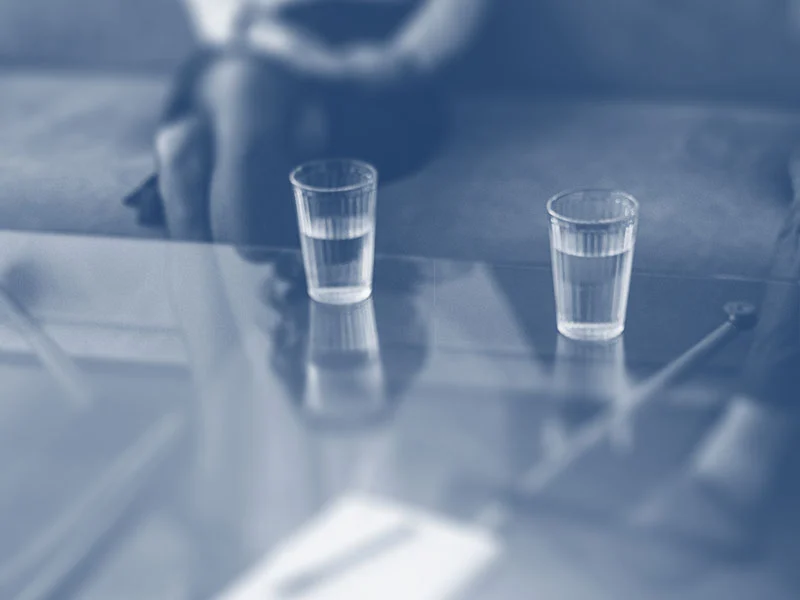
Is Addiction a Mental Health Issue?
Is addiction a mental health issue? The answer is “yes.” Addiction can even make a person more likely to develop other mental health disorders, such as depression and anxiety. Below, we’ll discuss why addiction is a mental illness, how it impacts the brain, and how to seek help.
Why Is Addiction a Mental Illness?
The National Institute of Mental Health classifies addiction as a mental health disorder because it’s caused by chemical changes in the brain that lead a person to seek out their chosen substance. People suffering from addiction can also have co-occurring mental health disorders that exacerbate their struggles with addiction. According to the National Institute of Mental Health, nearly half of people who experience a mental illness over the course of their life will also struggle with a co-occurring Substance Use Disorder, and vice versa.

What Addiction Does to the Brain
Addictive substances like alcohol and drugs function by increasing the levels of dopamine in your brain by as much as 10 times their natural level. Because dopamine causes feelings of pleasure, the use of the substance is something you can quickly become chemically attached to.
Over time, however, the brain gets used to these increased levels of dopamine, meaning habitual users will experience less and less pleasure. To compensate, a person will need to use more of the substance or use it more frequently. At this point, the person has developed a tolerance to the substance. When they’ve arrived at the point where they need to use the substance just to feel normal, they’ve reached the point of dependence.
Types of Addiction
Addiction is most often associated with substance use disorders such as alcohol or drug abuse. But other unhealthy and harmful behaviors are also classified as addictions and can require treatment if the individual is to recover. Some common types of addiction are:
-
- Nicotine addiction.
- Prescription drug addiction, including addiction to Valium, Xanax, and similar drugs.
- Alcohol addiction.
- Opioid addiction, including addiction to OxyContin, Vicodin, morphine, and similar drugs.
- Cocaine addiction.
- Gambling addiction.
- Internet, phone, or social media addiction.
- Shopping addiction.

Addiction and Mental Illness
The link between addiction and mental illness is often considered a chicken-or-the-egg problem. In other words, did the mental illness come first and cause the addiction, or did the addiction come first and cause the mental illness?
There isn’t a definitive answer, ultimately, but the question does help us recognize the profound links between addiction and mental illness, reinforcing the importance of a dual diagnosis treatment plan when seeking help.
A dual diagnosis occurs when a person suffers from addiction and another mental health disorder, such as depression or anxiety, at the same time. Addiction and other mental health disorders have several risk factors in common and can mutually reinforce one another.
Mental health disorders are only one of the factors that can increase a person’s chances of developing an addiction. Other factors that can make a person more likely to become addicted to a substance include biological and environmental factors and family history. If you’re experiencing some of the signs of addiction and/or mental illness, it’s important to seek help.
-
- An inability to quit the substance despite continued attempts
- Thinking too much about obtaining, using, and recovering from substances
- Having trouble keeping up with work, school, or social responsibilities without using the substance
- Experiencing symptoms of withdrawal when you try to quit
- Stealing or lying to maintain your addictive behavior
- Feeling shame and regret in connection to your substance-seeking behavior
- Psychotic episodes, including hallucinations and delusions
- Having trouble keeping a job or maintaining friendships and relationships due to behavioral issues
- Using a substance to manage your stress and anxiety
- Having feelings of despair and hopelessness for more than two weeks
- Using elaborate routines to cope with anxiety and stress
- Refusing support from loved ones and friends or withdrawing from them

Diagnosis and Treatment
If you think you’re experiencing symptoms of either addiction or a mental health disorder, you should speak to a mental health professional to receive a diagnosis. From there, treatment may include medication or behavioral therapies and counseling. Because substance abuse and addiction can often go together with a co-occurring mental health disorder, personalized treatment that addresses other mental health disorders is important.
At Beachway Therapy Center, our dual diagnosis approach to treatment includes personalized addiction treatment for many different substances, including alcohol, cocaine, amphetamines and meth, and more. As part of a dual diagnosis, you’ll also receive personalized mental health treatment. If you or a loved one are interested in learning more about treatment, contact us today.



